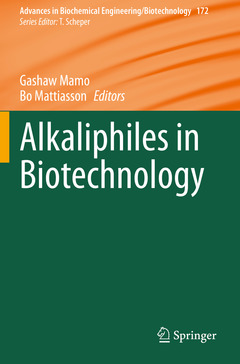Description
Alkaliphiles in Biotechnology, 1st ed. 2020
Advances in Biochemical Engineering/Biotechnology Series, Vol. 172
Coordinators: Mamo Gashaw, Mattiasson Bo
Language: English
Subjects for Alkaliphiles in Biotechnology:
Keywords
Extremophiles in biotechnology; cultivation of alkaliphiles; Alkaline environment; Alkaline active enzymes; proteases in the leather industry; Starch modifying enzymes; Hemicellulose; Alkaliphiles for waste treatment; Alkaliphiles in self-healing concrete; whole-cell applications of alkaliphiles; alkaliphiles microbiology; Adaptive mechanisms of alkaliphiles
Publication date: 06-2021
349 p. · 15.5x23.5 cm · Paperback
Publication date: 06-2020
349 p. · 15.5x23.5 cm · Hardback
Description
/li>Contents
/li>Comment
/li>
This book is devoted to alkaliphiles, their microbiology, biotechnological applications and adaptive mechanisms. Alkaliphiles are extremophilic organisms that are adapted to thrive in alkaline environments. Over the years, a wide variety of alkaliphiles belonging to domain Bacteria, Archaea and Eukarya have been isolated and studied. These organisms use various adaptive mechanisms to thrive in ?extreme? alkaline environments, and some of these adaptive mechanisms are of immense importance to a range of biotechnological applications. In this book, readers will learn about the adaptive strategies of alkaliphiles in colonizing alkaline habitats, with a main focus on: (1) the production of enzymes that are active and stable in the high pH environment, and (2) the production of acids that decrease the pH of their immediate surrounding environment.
Enzymes that are operationally stable at high pH (also known as alkaline active enzymes) are desirable in several applications such as detergent formulating and leather tanning processes, and they are among the major selling enzymes and the most important industrial enzymes. The growing demand in many existing and emerging biotechnological applications led to the discovery, characterization, engineering and evaluation of diverse types of alkaline active enzymes. In addition to the use of these fascinating enzymes in biotechnological applications, readers will discover the mechanisms of action and stability of these enzymes at extreme pH.Studies have shown that some alkaliphiles decrease the severity of the high pH of their media by producing substantial amount of organic acids, which could be of great interest in various applications presented in this book. In addition to enzymes and organic acids, other products of biotechnological importance such as carotenoids, bioactive substances, and chelators have also attracted researchers? attention. Whole-cells of alkaliphiles have been used as food and feed, and are also useful in environmental applications such as in waste treatment and construction.
Alkaliphiles: The Versatile Tools in Biotechnology.- Isolation and Cultivation of Alkaliphiles.- Challenges and Adaptations of Life in Alkaline Habitats.- Genomics of Alkaliphiles.- Metabolites Produced by Alkaliphiles with Potential Biotechnological Applications.- Alkaliphilic Enzymes and Their Application in Novel Leather Processing Technology for Next-Generation Tanneries.- Starch-Modifying Enzymes.- Alkaline Active Hemicellulases.- Alkaliphiles: The Emerging Biological Tools Enhancing Concrete Durability.
Outlines the major biotechnological applications and adaptive mechanisms of alkaliphiles
Passes on knowledge of world-class experts in alkaliphiles microbiology and biotechnology
Reviews important products and whole-cell applications of alkaliphiles
These books may interest you

ExtremophilesWhere It All Began 42.19 €

ExtremophilesWhere It All Began 42.19 €


